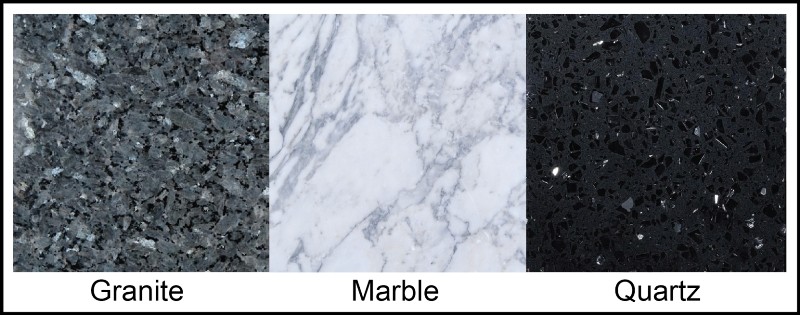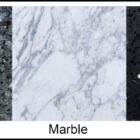Granite Marble and Quartz Difference
Do you know the difference between marble, granite, and quartz countertops just by looking at them? Unless you’ve spent quite a lot of time in the custom fabrication business like us, all countertops may look the same. However, marble, granite, and quartz have different chemical makeups, which makes them visually different. The differences in chemical compositions also affect how durable each countertop material is. Today we’re going to attempt to train your eye. Here is how you can tell marble, granite, and quartz apart.
Granite
Granite, like marble, is another natural stone. The standard colors that it comes in are white, gray, reddish, brown, and black. Granite is a “phanerite” rock meaning that it has large, distinguished clumps of crystals and minerals. In other words, granite is often speckled and grainy and does not have distinct streaks in the way that marble does. Granite is also opaque and not translucent. If you’re a homeowner that’s looking for a durable, low-maintenance maintenance option without skimping out on style, then granite is indeed an excellent choice.
Marble
If you like extravagance and elegance, then a marble countertop is indeed for you. We consider marble a material that you merely show off, so we advise you to be careful with this material. Typically, marble without impurities will be a solid white color, but most marble contains other minerals and can be a bluish color along with gray, pink, yellow, or black. It all depends on the amount of iodization. These colors won’t be stark unless it’s mixed with an engineered stone or mixed with other minerals.
Authentic marble also has an unparalleled glossiness to it and is very translucent. Marble shows stains and etches over time. If this doesn’t happen, then that’s an indicator that the countertop material is granite or possibly an engineered stone.
Quartz
Quartz is an engineered stone and not a natural stone. This material can form a unique mix of granite, marble, or other natural stone. With this in mind, a quartz countertop is the hardest to distinguish. The best way to tell is by observing how “perfect” or “even” the countertop looks. With natural stone, no two slabs will ever look the same. However, with engineered stone, the finished product may look more uniformed and consistent.
Still, custom fabrication has come such a long way that it has become increasingly hard to identify and narrow down the visual differences between natural stone and engineered stone. Quartz is another durable, low-maintenance option. Also, because it’s nonporous, the material less susceptible to damages.





